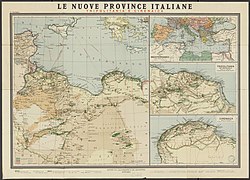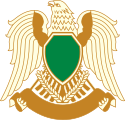
The politics of Libya has been in an uncertain state since the collapse of the Libyan Arab Jamahiriya in 2011 and a recent civil war and various jihadists and tribal elements controlling parts of the country. On 10 March 2021, the interim Government of National Unity (GNU), unifying the Second Al-Thani Cabinet and the Government of National Accord was formed, only to face new opposition in Government of National Stability, until Libyan Political Dialogue Forum assured the ongoing ceasefire.

The Armed Forces of the Libyan Arab Jamahiriya consisted of the Libyan Army, Libyan Air Force and the Libyan Navy and other services including the People's Militia. In November 2010, before the 2011 Libyan Civil War, the total number of Libyan personnel was estimated at 780,000 though that war wore the military's numbers away. There was no separate defence ministry; all defence activities were centralised under Muammar Gaddafi. There was a High Command of the Armed Forces. Arms production was limited and manufacturers were state-owned. Colonel Abu-Bakr Yunis Jabr was the last minister of defence of the Gaddafi-era military.

Muammar Muhammad Abu Minyar al-Gaddafi was a Libyan revolutionary, politician and political theorist who ruled Libya from 1969 until his assassination by rebel forces in 2011. He first served as Revolutionary Chairman of the Libyan Arab Republic from 1969 to 1977 and then as the Brotherly Leader of the Great Socialist People's Libyan Arab Jamahiriya from 1977 to 2011. Initially ideologically committed to Arab nationalism and Arab socialism, Gaddafi later ruled according to his own Third International Theory.

The Third International Theory, also known as the Third Universal Theory and Gaddafism, was the style of government proposed by Muammar Gaddafi on 15 April 1973 in his Zuwara speech, on which his government, the Great Socialist People's Libyan Arab Jamahiriya, was officially based. It combined elements of Arab nationalism, Nasserism, Anti-imperialism, Islamic socialism, left-wing populism, African nationalism, Pan-Arabism, and it was partly influenced by the principles of direct democracy. The theory also contained elements of Islamic fundamentalism, for Gaddafi argued that Muslims needed to return to God and the Qur'an and rejected formal interpretation of the Qur'an as blasphemy. However, Gaddafi's regime has been described as Islamist, rather than fundamentalist, for he opposed Salafism, and many Islamic fundamentalists were imprisoned during his rule.

The General People's Congress, often abbreviated as the GPC, was the national legislature of Libya, during the existence of Muammar Gaddafi's Libyan Arab Jamahiriya. It consisted of 2,700 representatives of the Basic People's Congresses (BPC). The GPC was the legislative forum that interacted with the General People's Committee (GPCO), whose members are secretaries of Libyan ministries. It notionally served as the intermediary between the masses and the leadership and was composed of the secretariats of some 600 local "basic popular congresses."

Human rights in Libya is the record of human rights upheld and violated in various stages of Libya's history. The Kingdom of Libya, from 1951 to 1969, was heavily influenced and educated by the British and Y.R.K companies. Under the King, Libya had a constitution. The kingdom, however, was marked by a feudal regime. Due to the previous colonial regime, Libya had a low literacy rate of 10%, a low life expectancy of 57 years, with many people living in shanties and tents. Illiteracy and homelessness were chronic problems during this era, when iron shacks dotted many urban centres on the country.

Muammar Gaddafi became the de facto leader of Libya on 1 September 1969 after leading a group of young Libyan Army officers against King Idris I in a bloodless coup d'état. After the king had fled the country, the Revolutionary Command Council (RCC) headed by Gaddafi abolished the monarchy and the old constitution and established the Libyan Arab Republic, with the motto "freedom, socialism and unity". The name of Libya was changed several times during Gaddafi's tenure as leader. From 1969 to 1977, the name was the Libyan Arab Republic. In 1977, the name was changed to Socialist People's Libyan Arab Jamahiriya. Jamahiriya was a term coined by Gaddafi, usually translated as "state of the masses". The country was renamed again in 1986 as the Great Socialist People's Libyan Arab Jamahiriya, after the United States bombing that year.
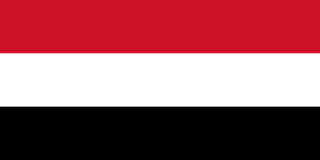
The Revolutionary Command Council was the twelve-person governing body that ruled the Libyan Arab Republic after the 1969 Libyan coup d'état by the Free Officers Movement, which overthrew the Senussi monarchy of King Idris I. The council's chairman was Muammar Gaddafi, who had the most influence and served as Libya's de facto head of state as Revolutionary Chairman of the Libyan Arab Republic and commander-in-chief of the armed forces. It was ideologically Arab nationalist, republican, anti-imperialist and pan-Arabist.

The General People's Committee, often abbreviated as the GPCO, was the executive branch of the government of Libya, during the existence of Muammar Gaddafi's Libyan Arab Jamahiriya. It served as the intermediary between the masses and government leadership and was composed of the Secretary-General and twenty secretaries of some 600 local Basic People's Congresses (BPC), GPCO members were elected by the country's parliament, the General People's Congress (GPC), and had no fixed terms.

The Libyan civil war or the 2011 Libyan revolution, also known as the First Libyan Civil War, was an armed conflict in 2011 in the North African country of Libya that was fought between forces loyal to Colonel Muammar Gaddafi and rebel groups that were seeking to oust his government. The war was preceded by protests in Zawiya on 8 August 2009 and finally ignited by protests in Benghazi beginning on Tuesday 15 February 2011, which led to clashes with security forces who fired on the crowd. The protests escalated into a rebellion that spread across the country, with the forces opposing Gaddafi establishing an interim governing body, the National Transitional Council.

Abu-Bakr Yunis Jabr was a Libyan military officer and politician was the Libyan Secretary of the Libyan General Committee for Defence during the rule of Muammar Gaddafi. His official position was Secretary of the Libyan General Interim Committee for Defence.
The Qadhadhfa is one of the Arab Ashraf tribes in Libya, living in the Sirte District in present-day northwestern Libya. They are traditionally counted amongst the country's Ashraf tribes, and during the Gaddafi regime were regarded as being one of the greatest and most powerful tribes in the whole country. They are now mostly centered at Qasr Abu Hadi, Sirte.
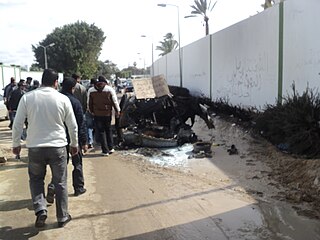
United Nations Security Council Resolution 1970 was a measure adopted unanimously by the UN Security Council on 26 February 2011. It condemned the use of lethal force by the government of Muammar Gaddafi against protesters participating in the Libyan Civil War, and imposed a series of international sanctions in response.

The Brotherly Leader and Guide of the Revolution of the Great Socialist People's Libyan Arab Jamahiriya was a title held by former Libyan leader Muammar Gaddafi, who claimed to be merely a symbolic figurehead of the country's official governance structure. However, critics long described him as a dictator, referring to his position as the de facto former political office, despite the Libyan state's denial of him holding any power.
The Cultural Revolution in Libya was a period of political and social change in Libya. It started with Muammar Gaddafi's declaration of a cultural revolution during a speech in Zuwara on 15 April 1973. This came after increasing tensions between Gaddafi and his colleagues in the Revolutionary Command Council (RCC) had led him to agree to step down. Gaddafi had told the RCC that he would announce his resignation to the people at the Zuwara speech, but he instead surprised them with his declaration of the Cultural Revolution. By the end of the Cultural Revolution period, Gaddafi was the uncontested leader of Libya.
The following lists events that happened in 1979 in Libya.
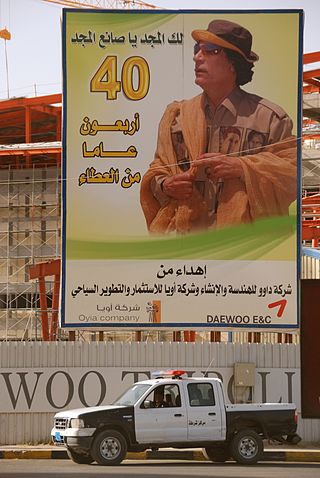
The 40th anniversary of the Libyan Revolution was a ruby jubilee anniversary in the Great Socialist People's Libyan Arab Jamahiriya celebrated on 1 September 2009 in honor of the 1969 Libyan coup d'état.
Having taken power in a coup three months earlier, Muammar Gaddafi faced a mutiny by army and interior ministers Moussa Ahmed and Adam Hawaz, both from the eastern Barqa region. The pair were routed and imprisoned in the first of Gaddafi's many survivals.
The Revolutionary Women's Formation (RWF) was a women's organization in Libya, founded in 1970. It was initially called the Women's General Union (WGU), renamed Jamahiriya Women's Federation in 1977, and finally named Revolutionary Women's Formation (RWF).
Bashir Saghir Hawadi, also transliterated as Hawady or Houadi, is a Libyan major general who served under Muammar Gaddafi. He was among the twelve original members of the Libyan Revolutionary Command Council, the chief judge of the Libyan People's Court, and the General Secretary of the Arab Socialist Union.
